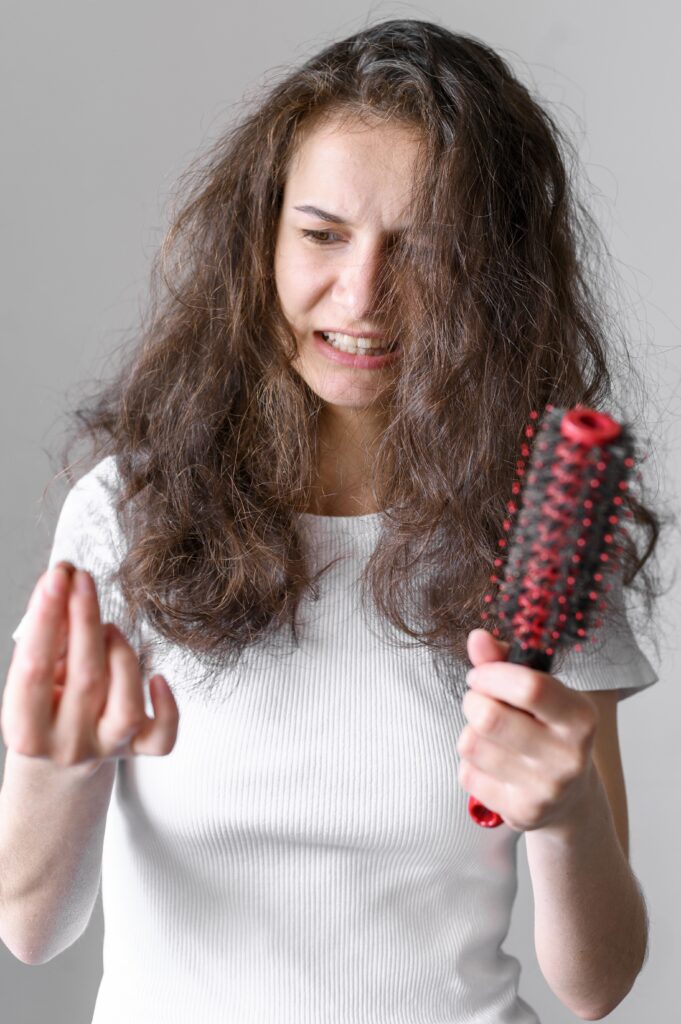Hair Fall Myths vs Facts: A Dermatologist’s Guide
Hair fall is one of the most common concerns among people of all ages. However, social media trends, home remedies and misinformation often create confusion. Understanding the difference between myths and facts is essential for protecting hair health and choosing the right treatment.
Myth 1: Oiling the Hair Stops Hair Fall
Fact:
Oil improves hair texture but cannot treat medical causes of hair fall. In certain scalp conditions, heavy oiling can even worsen hair fall.
Myth 2: Hair Fall Happens Only Due to Poor Hygiene
Fact:
Hair fall has multiple causes including genetics, hormones, stress, nutritional deficiencies and scalp disorders. Hygiene alone does not determine hair fall.
Myth 3: Frequent Shampooing Causes Hair Fall
Fact:
Shampooing does not cause hair fall. The hair that sheds during washing was already in the natural shedding phase.
Myth 4: Wearing a Cap or Helmet Causes Baldness
Fact:
Helmets or caps do not damage hair roots. Only extremely tight headgear causing constant pulling may contribute to breakage.
Myth 5: Hair Fall Is Always Permanent
Fact:
Many types of hair fall are temporary and reversible with treatment. Genetic hair loss is long term but can be controlled with medical care.
Myth 6: Cutting Hair Frequently Makes It Grow Faster
Fact:
Hair growth happens at the roots. Trimming helps with split ends but does not increase growth rate.
Myth 7: Natural Remedies Can Cure All Hair Fall Problems
Fact:
Home remedies cannot treat genetic, hormonal or autoimmune causes of hair loss. Medical evaluation is often necessary.
Myth 8: Hair Products Like Gel and Wax Cause Permanent Hair Loss
Fact:
Styling products may cause dryness but do not lead to permanent hair loss when used properly and washed out regularly.
Myth 9: Massaging the Scalp Prevents Baldness
Fact:
Scalp massage may improve blood circulation but does not stop hereditary hair loss.
Myth 10: Only Older Men Experience Hair Fall
Fact:
Hair fall can affect younger individuals due to stress, lifestyle changes and nutritional deficiencies.
Myth 11: Switching Shampoos Causes Hair Fall
Fact:
Changing shampoos does not trigger hair fall. If shedding increases, it may be due to scalp sensitivity to certain ingredients.
Myth 12: Hair Fall Is Always Due to Genetics
Fact:
Besides genetics, factors such as stress, illness, hormones, poor nutrition and scalp disorders can also cause hair fall.
When to Seek Professional Help
Seek a dermatologist if you experience:
- Hair fall lasting more than three months
- Bald patches or sudden shedding
- Severe dandruff or scalp irritation
- Progressive thinning at the crown or hairline
- No improvement despite home care
Frequently Asked Questions (FAQs)
1) Can home remedies completely stop hair fall?
Home remedies may improve scalp health but cannot treat genetic or hormonal causes of hair fall.
2) Does stress really cause hair fall?
Yes. Stress can trigger telogen effluvium, a temporary shedding phase.
3) Will shaving the head make hair grow back thicker?
No. Hair thickness and density are determined by genetics, not shaving.
4) Can diet affect hair fall?
Yes. Deficiencies in iron, protein, Vitamin D, zinc and B12 contribute to hair fall.
5) Is hair fall more common in men than women?
Yes. Male pattern baldness is common, but women also experience hair fall frequently.
6) Do hot showers increase hair fall?
Very hot water can dry out the scalp and weaken hair strands.
7) Can dandruff cause hair fall?
Yes. Severe dandruff and scalp inflammation can weaken hair roots.
8) Is hair fall reversible?
Many types are reversible. Genetic hair loss can be slowed with treatment.
9) How long does treatment take to show results?
Most treatments show improvement in about three to six months.
10) When should I see a dermatologist?
If hair fall persists for more than three months, if bald patches appear or if home remedies fail.
Conclusion
Myths about hair fall can lead to confusion, delayed treatment and improper hair care practices. Understanding the scientific facts helps in taking the right steps to protect and maintain hair health. Most types of hair fall are manageable when addressed early with proper diagnosis and treatment. Consulting a dermatologist ensures a personalised approach and better long-term results.

